|
Moscow subway blasts:
Death toll rises to 39
DAVID NOWAK
A woman has died in a clinic from wounds
suffered in the double suicide bombing of the Moscow subway, officials
said Tuesday, raising the death toll to 39 as the country entered a day
of mourning.
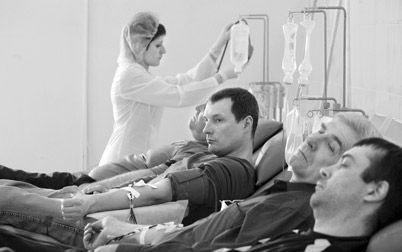 |
|
Russians donate blood for the victims
of the terrorist metro blasts at a Moscow clinic. |
Five people remain in critical condition out
of 71 hospitalized after the blasts that were blamed on Chechen rebels,
city health department official Andrei Seltsovsky told the Rossiya-24
state news channel. Only eight victims had been formally identified, he
said.
The preliminary investigation found that
female suicide bombers detonated belts of explosives during the Monday
morning rush-hour at two central Moscow subway stations. It was the
first terrorist activity in the Russian capital for years.
Flags flew at half staff on Government
buildings and at the Kremlin as a day of national mourning began.
Entertainment events and shows on television were cancelled. Services
were to be held at several churches.
Heightened transportation security remained
in effect across the capital and in cities across Russia. Police with
machine guns and sniffer dogs patrolled subway entrances.
Monday’s first explosion took place just
before 8 am at the Lubyanka station in central Moscow, beneath the
notorious headquarters of the Federal Security Service (FSB), the KGB’s
main successor agency. The FSB is a symbol of power under Prime Minister
Vladimir Putin, a former KGB officer who headed the agency before his
election as president in 2000.
About 45 minutes later, a second blast hit
the Park Kultury station on the same subway line, which is near the
renowned Gorky Park. In both cases, the bombs were detonated as the
trains pulled into the stations and the doors were opening.
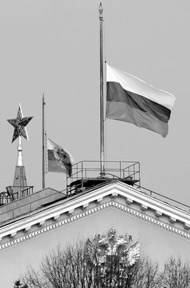 |
|
Russian flags fly at half-mast over
the Kremlin in Moscow on March 30, 2010 during a day of
mourning for the victims of a terrorist bomb attack. Moscow
held a day of mourning for the 39 people killed in a pair of
underground suicide bombings as the Russian authorities
faced pressure to prevent a resurgence of deadly militant
attacks. AFP |
Debate raged in the Russian media as to the
exact motive for the attacks. Newspapers speculated that the blasts were
retaliation for the recent killing of militant leaders in the North
Caucasus by Russian police.
The armed militancy Prime Minister Vladimir Putin vowed to crush on
his rise to power a decade ago sent the Kremlin a defiant message on
Monday, carrying out Moscow’s worst attack in six years and highlighting
the failures of Russia’s policy in it most turbulent region.
The response to two blasts that killed 39 people on the Moscow metro
will be an important indicator of how Russia’s ruling tandem will
approach violent unrest in the heavily Muslim North Caucasus, a crucial
hurdle to the country’s security and success.
The attack could also play into political intrigue ahead of the
Presidential Election in 2012, when Putin, still seen as Russia’s top
leader after steering Dmitry Medvedev into the Kremlin in 2008, could
seek a return to the Kremlin.
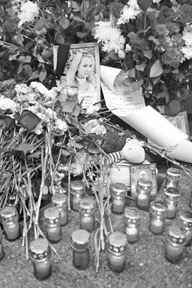 |
|
Candles and flowers surround the
portrait of a victim of the terrorist metro blasts inside
the Lubyanka metro station in Moscow |
In a previous stint as Prime Minister, Putin led Russia into its
second post-Soviet war against rebels in the North Caucasus province of
Chechnya after a series of deadly apartment building bombings in Moscow
and other cities.
Putin at one point vowed that rebels would be tracked down and killed
even ‘in the outhouse’, typical of the tough talk that bolstered his
popularity during his 2000-2008 Presidency.
“This is a direct affront to Vladimir Putin, whose entire rise to
power was built on his pledge to crush the enemies of Russia,” Britain’s
Royal United Services Institute Jonathan Eyal said of the bombings on
Monday.
The Kremlin’s response could be tougher tactics against the North
Caucasus militant groups that have tested the Kremlin’s
counter-terrorism policies for a generation.
There were no immediate claims of responsibility, but officials
steered suspicion toward the North Caucasus.
Moscow Mayor Yuri Luzhkov said the attacks were carried out by female
suicide bombers, a method that has been used by Chechen rebels, and the
Federal Security Service (FSB) chief said they were likely from the
North Caucasus.
Rights groups say crackdowns in the turbulent region only fuel the
anger that feeds the insurgency nearly a decade after the war Putin
ousted Chechnya’s separatist Government. President Dmitry Medvedev has
lately underscored a need to tackle underlying causes such as
corruption, poverty and abuse of authority.
But Matthew Clements, Eurasia analyst at IHS Jane’s Information
Group, said the attacks on Monday could strengthen the hand of the
hard-liners in Russia’s ruling elite.
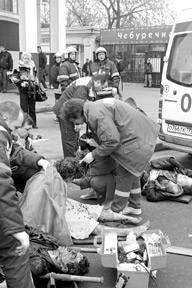 |
|
Rescue services and firefighters take
care of victims from the Park Kultury metro station |
That could lead to tougher tactics that “could involve a stepping
away from the dual approach of pursuing social and economic development
alongside security action.” Analysts also say more robust action could
deter Muslim communities on the receiving end from providing the vital
intelligence such a counter-insurgency campaign would need.
Frightened, frustrated but ultimately stoical, thousands of Russian
commuters poured out of their capital’s metro on Monday after twin
bombings caused carnage on the network’s busiest line.
As they emerged from at the height of the morning rush hour,
Muskovites found traffic jams, taxi drivers doubling their prices, and a
mobile phone system under severe strain.
Explosions triggered by female suicide bombers in trains at two
central underground stations killed dozens in the worst attack on the
Russian capital since February 2004.
“I’m scared. In Moscow we live like on a powder keg,” Yevgeniya
Popova told Reuters television near the Lubyanka metro station, where
the first blast hit shortly before 8.00am(0500GMT).
Many Muscovites simply soldiered on, looking for alternate routes to
work. Some pressed cell phones to their ears as they tried to get
through to explain they would be late, to do business, or to make sure
loved ones were safe.
Next to Popova, a man in his thirties who was visiting Moscow frowned
with frustration after half an hour trying in vain to reach his brother.
“I’m not scared, but I feel like we’re at war,” he said. “My only
feeling is to take vengeance. On whom? I don’t know yet.
But it cannot remain unpunished.”
North Caucasus
There was no immediate claim of responsibility, but security
officials linked the attacks to the North Caucasus, where the Kremlin is
fighting a growing Islamist insurgency a decade after driving
separatists from power in Chechnya.
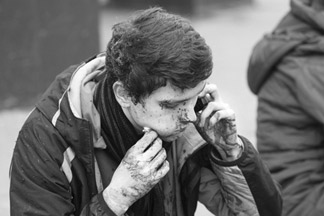 |
|
A wounded man gives a phone call
outside the Park Kultury metro station |
Popova had no theories about who was behind the blasts.
“Maybe the rebels, maybe Chechnya. Someone is fighting someone. To be
honest, I’m lost.” Ekho Moskvy radio said two women wearing Muslim-style
headscarves were beaten by four or five passengers on a metro train
after the bombings.
Russia is plagued by a strong undercurrent of bias against ethnic
minorities from the Caucasus and Central Asia.
Russian media said security agencies were blocking mobile phone
connections in the center of Moscow after reports that the bombs were
detonated with the help of cellphones. But authorities later said the
bombers had blown themselves up.
The second blast hit a metro train in the Park Kultury metro station
some 40 minutes after the first explosion.
Both stations are on the red line, which runs close to the Kremlin
and is one of the busiest in Moscow. Part of the line was closed and
other lines were hit by delays, but the entire system was not shut down.
Announcements informed passengers of delays due to ‘technical
reasons’, avoiding anything more specific.
A number of bomb blasts in Moscow in the late 1990s and early 2000s
put residents on guard, with travelers warily eyeing each stray shopping
bag or briefcase. But some shed those habits as years passed without an
attack.
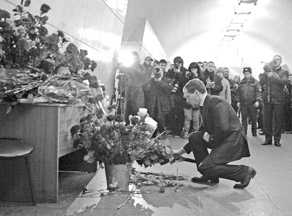 |
|
Russian President Dmitry Medvedev lays
flowers in memory of the victims of a terrorist blast at the
Lubyanka metro station in Moscow |
“I’ve been walking to work through the entire (Moscow) center because
I’m not going to ride the metro today,” an unidentified woman told state
television Rossiya 24.
RIA news agency said taxi drivers inflated their rates wildly,
charging around $100 per journey between some train stations, at least
double the usual amount.
The leader of the Russian Orthodox Church, Patriarch Kirill,
condemned the attack, and also the taxi drivers.
“This money will do you no good,” he said in televised remarks.
“Return it, spend it on a good cause. A desire to cash in on someone’s
distress will only bring you grief.”
REUTERS
|



